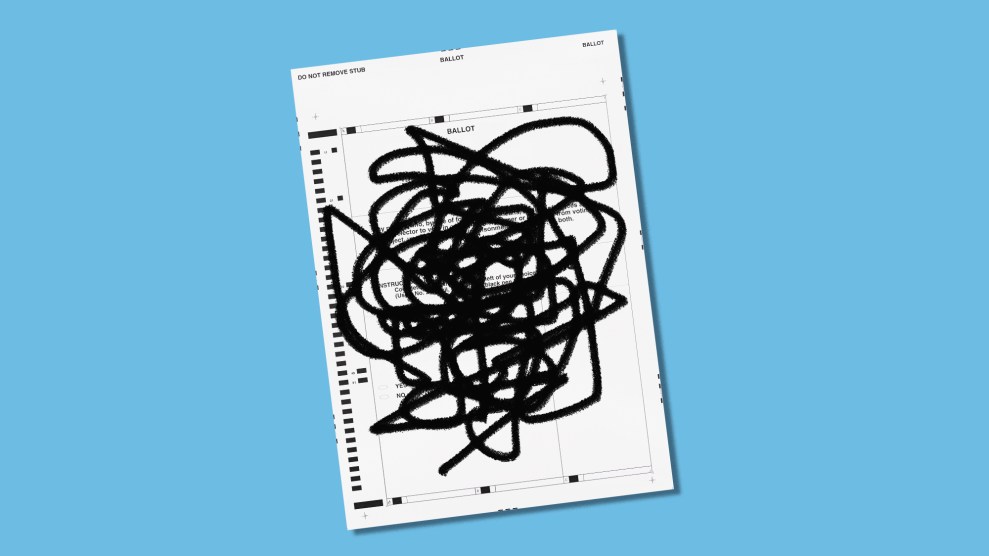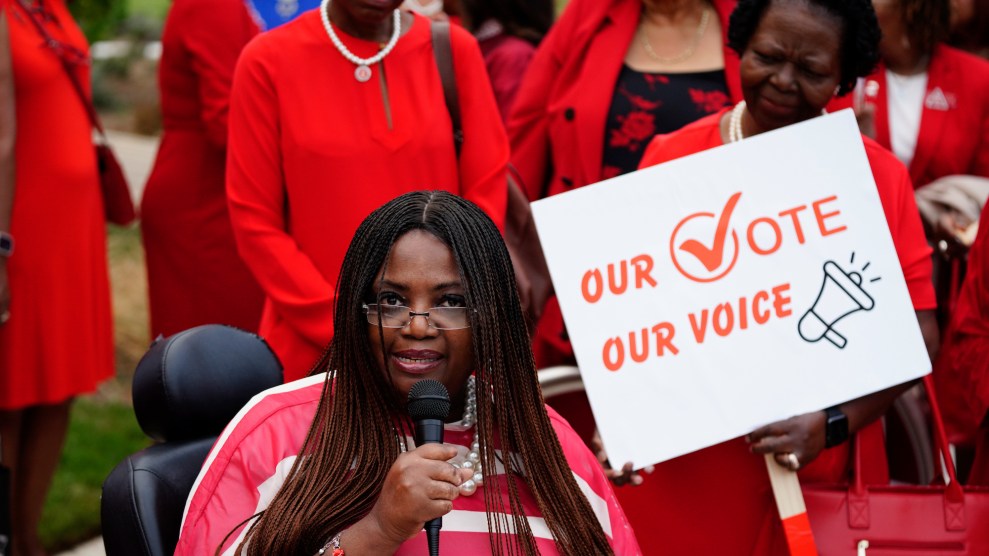
Mother Jones; Getty
When Daniel Francis enters a voting booth, ballot measures can be very anxiety-inducing: Many are above his reading level.
“If it’s using words that I don’t understand, I just kind of rush on to answer, whether I know what it means or not,” says Francis, who lives with mental disabilities including autism and ADHD. Francis likes voting at the polls without assistance, as it’s a way for him to feel independent.
Having accessible ballots “would empower more people to be able to vote without assistance.”
A Ballotpedia analysis of ballot measures voted on in 2023 found that, on average, they required a graduate-school reading level to understand. That can be a challenge for most people who haven’t pursued higher education, let alone people with intellectual disabilities or symptoms that affect their cognition, like those experiencing brain fog from the chronic illness fibromyalgia.
Having accessible ballots “would empower more people to be able to vote without assistance,” says Alexia Kemerling, who helps coordinate efforts to make voting more accessible at the American Association of People with Disabilities.
This past April, Francis was part of a group of disability self-advocates who met with Maine Secretary of State Shenna Bellows to discuss the possibility of making ballot measures more accessible to disabled voters—which can also be helpful to other groups, such as English language learners.
In 2023, lawmakers in both North Dakota and New York passed legislation to put ballot measures in plain language, which is designed to be easier to understand on a first reading, and often includes active voice, shorter sentences and paragraphs, and the use of common words. In New York, ballot measures now can’t exceed an eighth-grade reading level.
“I think having that reading level stipulation, and actually having something to measure it against, is going to be really impactful in New York,” Kemerling said.
The impassioned push for more accessible ballots in Maine started last November, after the failure of a measure to remove language from its constitution barring people with mental disabilities under guardianship from voting. (People in Maine under guardianship for mental disabilities nevertheless have the right to vote due to a 2001 federal court ruling—the measure would have removed the defunct language.)
In discussions with other disabled people after that 2023 election, Francis found that several hadn’t understood exactly what the Maine measure was asking:
Do you favor amending the Constitution of Maine to remove a provision prohibiting a person under guardianship for reasons of mental illness from voting for Governor, Senators and Representatives, which the United States District Court for the District of Maine found violates the United States Constitution and federal law?
“For the vast majority of voters,” said Molly Thompson, a voting access advocate with Disability Rights Maine, “that’s really confusing to understand—if something was deemed unconstitutional, why was it not immediately removed from Maine’s constitution?”
Writing in plain language doesn’t necessarily mean being concise, which Maine’s constitution requires for ballot measures written by the secretary of state (measures written by the legislature do not have this requirement). In fact, when ballot measures are written in plain language, they tend to run longer, Kemerling says, which is a challenge to getting some election officials on board. “It’s important that election officials are willing to ask for and allocate [the] costs to having more accessible elections,” she said, suggesting the compromise of a separate, plain language sheet explaining ballot measures on request.
Some other states also have plain language requirements, though they’re not as far-reaching as New York and North Dakota’s. Alabama requires a plain language summary of state ballot initiatives to be available online, and in Texas, ballot initiatives that specifically touch on debt are supposed to be written in plain language.
Francis hopes that politicians in Maine will also get on board with more understandable ballots, so more disabled people feel confident voting. The way ballot measures are written now, Francis said, can lead to disabled people like him feeling “like they’re being discouraged to vote.”


















